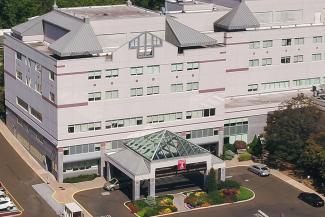Temple Health surgeons use the da Vinci® Surgical System to perform minimally invasive partial and total cystectomy (removal of the bladder), as well as bladder reconstruction in patients with bladder cancer.
Robotic-Assisted Partial Cystectomy
If you have superficial bladder cancer – meaning it has not spread into the bladder muscles – you may be a candidate for robotic-assisted partial cystectomy. In this procedure, the surgeon inserts a traditional scope through the urethra to remove (resect) the cancerous portion of the bladder.
This procedure allows you to keep most of your bladder, thus maintaining relatively normal bladder function. During the surgery, your physician may remove nearby lymph nodes to send to our pathology team for testing. The pathology team can determine the type and stage of your cancer, which can help determine if you need additional treatment options like chemotherapy or immunotherapy.
Robotic-Assisted Radical Cystectomy
If you have invasive bladder cancer – meaning the cancerous cells have moved into the bladder muscles – you may need to have your bladder completely removed. This procedure is called a radical, or total, cystectomy. During a radical cystectomy, the surgeon:
- Completely removes the bladder
- Removes the pelvic lymph nodes for testing
- Constructs a new or substitute bladder, or a urine drainage conduit
Female patients may also need to have their uterus and the portion of the vaginal wall that connects to the bladder removed. In most cases, the fallopian tubes and ovaries can be spared.
Male patients may need to have their prostate and/or urethra removed as well.
A More Conservative Approach to Cystectomy
Temple Health offers a robotic-assisted, minimally invasive approach to partial bladder removal, total bladder removal, bladder reconstruction and pelvic lymphadenectomy. The robotic technology gives more precision and range of motion, avoiding damage to the nearby nerves and tissue. Robotic technology can also help to preserve sexual function in some men.
Compared to traditional open surgery, the benefits of robotic-assisted procedures include:
- Less pain
- Less internal and external scarring
- Less blood loss and less need for a blood transfusion
- Quicker recovery time so you can return to your normal activities
The robotic technology also allows us to remove lymph nodes as effectively or more effectively than the most experienced open surgeons can offer.
If your urologist tells you that you are not a candidate for minimally invasive bladder surgery, we encourage you to schedule an appointment with a Temple Health urologist for a second opinion.
Ready for an Appointment?
Find a doctor near you, request an appointment, or call 800-TEMPLE-MED (800-836-7536) today.


